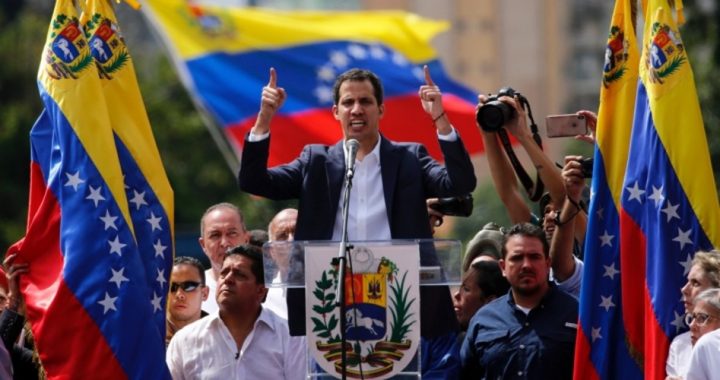
In the White House’s statement of support for Venezuela’s Juan Guaidó (the head of the country’s National Assembly) as interim president of that beleaguered country, President Trump said yesterday:
Today, I am officially recognizing the President of the Venezuelan National Assembly, Juan Guaidó, as the Interim President of Venezuela. In its role as the only legitimate branch of government duly elected by the Venezuelan people, the National Assembly invoked the country’s constitution to declare Nicolás Maduro illegitimate, and the office of the presidency therefore vacant….
I will continue to use the full weight of United States economic and diplomatic power to press for the restoration of Venezuelan democracy.
It’s going to take more than words to oust the Marxist dictator. As Guaidó himself said, “It needs to be the people, the military, and the international community [to] lead us to take over.”
The people have already responded, with hundreds of thousands of demonstrators (reminiscent of those in 2017) taking to the streets to protest Maduro’s illegitimate presidency on Wednesday. The international community, represented by the Organization of American States (OAS), is holding an emergency meeting on Thursday to consider its role. And there is some evidence that military support of Maduro may be fraying around the edges.
Maduro, however, continues to have the undying support of China, Russia, Cuba, Turkey, and Syria, with China and Russia issuing threats to Trump that he keep his hands off their surrogate. China has provided Maduro with an estimated $65 billion in loans, cash, and investment, while Russia has added substantial financial support as well. Russian Deputy Foreign Minister Sergei Ryabkov told the Russian journal International Affairs that U.S. military intervention “would be a catastrophic scenario that would shake the foundations of the development model which we see in Latin America.”
He added: “Venezuela is friendly to us and is our strategic partner. We have supported them and will support them.”
The support from Maduro’s military is slowly diminishing in light of his country’s economic decline. Its military installations’ infrastructures are steadily decaying due to lack of funds to keep them in good repair. Military salaries buy almost nothing thanks to Maduro’s runaway inflation. More than 4,000 officers deserted their posts last year. And legislators from the National Assembly (the country’s legitimate legislative body) are meeting with military officials who have expressed eagerness for a change at the top.
And there was an attack on a Caracas military outpost by two dozen National Guard officers on Monday that gave hope that an insurrection by the military might grow into a major uprising.
But, as The New American has reported, Maduro’s tentacles have reached into every part of the country:
He has created a “parallel” legislature to replace the legitimate National Assembly required by the country’s constitution. He has replaced judges on the country’s Supreme Court with his cronies. He has given the military the power to operate the state-owned oil company PdVSA and to control the flow of food to the cities. He is rewriting Venezuela’s constitution. He even violated the country’s present constitution by ignoring its demand that he be sworn in by the National Assembly and instead was sworn in by his cronies on the Supreme Court.
Maduro has been willing to use every means available to keep himself and his dictatorship in place. As Human Rights Watch (HRW) reported: “The Venezuelan government has brutally cracked down on members of the military accused of plotting against it. Not only are intelligence agents detaining and torturing members of the military, in some cases they are also going after their families or other civilians when they can’t find the suspects.”
And not just the military, either. HRW said that more than 12,800 civilians have been arrested for opposing his dictatorship since 2014, with many of them being tortured before being killed.
There is one thing President Trump can do to hasten the end of Maduro’s Marxist dictatorship in Venezuela: turn off his oxygen hose. At present, Maduro’s oil company, PdVSA, is exporting 500,000 barrels of crude oil every day to U.S. Gulf Coast refineries, generating cash flow for his regime of more than $20 million every day. Despite rumors that Trump is considering such a move, there has been no formal announcement confirming it.
Guaido is mostly right: It’s going to take support from the country’s citizens and neighbors and Maduro’s military to remove the dictator from office. Trump could hasten the inevitable by turning off his oil-export spigot.
Photo: AP Images
An Ivy League graduate and former investment advisor, Bob is a regular contributor to The New American magazine and blogs frequently at LightFromTheRight.com, primarily on economics and politics. He can be reached at [email protected].
Related articles:
Pressure to Oust Maduro Grows Inside and Outside Venezuela
Venezuela Legislature Wants Maduro Out; Brazil Recognizes Guaidó as President
Venezuela’s Marxist President Maduro Inaugurated for Second Term



